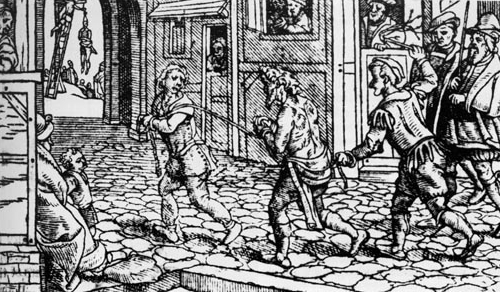The Anglo-Norman wakerant and its variants were associated with Latin vagari (to wander), and through that to ‘vagabond’, a word whose variants appear in French, Italian, Portuguese, and multiple other European languages.[1] In England, they represented a threat to law and order in the earliest recorded uses in legal enactments from the fourteenth century, and continued to attract similar attention in centuries to follow. In a speech to the Lord Mayor and the governors of Christ’s Hospital in 1676, Benjamin Long demanded that all vagrants leave London so they would no longer ‘infest the Air’ of the city with their ‘noysom breath’.[2] Long’s speech was partly a reaction to the rapid population growth of the sixteenth and seventeenth centuries, which had resulted in a large underemployed migratory labour force. As early as 1583, the English pamphleteer Philip Stubbes maintained that various travelling groups, such as tramps, itinerant beggars, ‘runne roging like vagarents up & downe the countries like maisterlesse men’.[3] The glut in the rural labour market meant that England’s towns and cities underwent a period of substantial urban growth, as people migrated from rural to urban areas in search of work. From 1520 to 1700, London’s population increased nearly tenfold, from 60,000 to an estimated 575,000, bringing increased numbers of unemployed or seasonally-employed ‘maisterlesse men’ who migrated to the city.[4] Local and national authorities perceived ‘masterless men’ as a threat to hierarchical, patriarchal society, and sought to restrict and prevent the influx of the unemployed poor.[5] One method of doing so was to differentiate between the ‘deserving’ and ‘undeserving, or the impotent poore’ and ‘impudent poore’.[6] ‘Vagrants’ were placed in the latter category. Scorned for their landlessness, mobility, and suspect occupations, vagrants, alongside rogues, vagabonds, slaves, apostates, itinerant ministers, and others, were considered a ‘blemish of our government, and a burthen to the commonwealth’.[7] Authorities placed vagrants under severe legal restrictions that were both popular and onerous, introducing ‘extreme punishement of all vagarantes’.[8] By the end of the seventeenth century, Long’s perception of vagrants as a ‘verminous brood’ who ‘swarm and poison our streets’ was commonplace, as was his hope that they ‘meet with the lash, and be taught the Lesson of Industry’.[9]
As noted in the discussion of the related term, ‘rogue’, literature and plays provided a means of both expressing and exploiting anxieties about social order and unrest. The subject of paranoid fixation, vagrants became scapegoats for tribulations that individual towns and the nation faced. Those who were most vulnerable to the large-scale socio-economic changes of the period often became those most harshly punished for their existence. In texts such as John Awdelay’s The fraternitye of vacabondes (1561), Thomas Harman’s A caveat for commen cursetors vulgarely called vagabones (London, 1567), and Robert Greene’s popular cony-catching pamphlets of the 1590s, they came to represent a form of alterity to social order, which was as fascinating as it was threatening.
Throughout such debates, authorities used the term ‘vagrant’ to refer to specific individuals, and as a blanket word for the undeserving poor, defined by unemployed migratory status. Occupying the other side of the spectrum were the ‘deserving poor’, who were provisioned for on a local level through national and parish legislation. The deserving poor included those who were precluded from working due to age, health or familial situations, in need of charity ‘through necessitie and not of choise’.[10] Often, the deserving poor were linked to specific parishes, whereas the vagrant was defined by their mobility and a lack of belonging, with early modern descriptions emphasizing their placelessness. As early as 1496, statutes were passed ordering parishes to provide provisions for these individuals.[11] At the same time, those who were considered to fall within the brackets of these ‘uncomely companies’ of ‘idle vagrants’ were immediately placed beyond the boundaries of poor relief and considered ‘altogether unworthy of any almes’.[12] The mass migration of the poor into town, cities, and colonies meant that those categorized as ‘vagrants’ played a key, although negatively-viewed, part in the growth of urban spaces. ‘Swarming like caterpillars’, vagrants were accused of ‘walking without shame, in theft, drunkennesse, and whoredome, in prophanenesse of life, and all ungodlinesse, swearing and cursing, lying and murthering, begetting a monstrous ofspring’.[13] In creating strict legislation against them, authorities hoped to prevent ‘indiscreete and wastfull giving’ to ‘counterfeit poore, or to vagrant and inordinate persons’.[14] Between 1550 and 1700, vagrants expanded to include a variety of professions that were believed to be socially and legally unacceptable: seamen, who lived ‘alwaies as vagarants’, to ‘tinkers’, ‘pedlers’, ‘English fugitives, vagrant in forraine Regions’, ‘Mercenarie preachers’ and ‘Usurers, Brokers…Ruffians, Blasphemers, Tiplers, Churles, Wantons, Pedlers of pernicious wares; Seminaries, Incendiaries, Apostates, Humorists’.[15] Whether considered an individual vagrant or a member of a vagrant group, like Gypsies, those who so identified were seen to be ‘seditious troublers of our peace’ by the legal, political, and religious leaders of Tudor and Stuart England.[16] One particular profession famously implicated as such were actors, for whom touring left them vulnerable to charges of vagrancy.[17] However, as Jeffery Knapp has pointed out there were legal distinctions ‘between licensed and unlicensed players’ which centred on the 1572 Act for the Punishment of Vagabonds.[18] However, professional actors who were licensed and had fixed abodes still struggled to shake the longstanding perception that they were ‘masterless men’ and vagrants as detractors of the theatre continued to discredit them.[19]
Local and national authorities regularly legislated against vagrancy. This served to remind vagrants of the legal and governmental forces that were vigilant to their presence and encouraged officials to enforce the law and punish those judged to be vagrants. Although Parliament had passed statutes against ‘Vagarauntz’ from the first half of the fifteenth century, a stream of legislation emerged under the Tudors and Stuarts.[20] Punishment varied and became increasingly harsh. Initially, arrested vagrants were given ‘three days and three nights and have none other sustenance but bread and water’, a punishment that changed to a whipping in 1530. Six years later, the punishment for repeat offenders was at first cropping (mutilation), then execution.[21] The Duke of Somerset’s 1547 Vagabonds Act provided for certain kinds of vagrants to be enslaved for a period of two years, and if caught trying to escape, the slavery extended for life.[22] Although quickly repealed in favour of a previous statute, the act, as Ben Lowe has described it, was ‘symptomatic of the desperation’ felt by successive governments at the ‘social dislocations that were occurring throughout the realm’.[23]
This dislocation contributed to the development of the Elizabethan poor laws, including the Vagabond Act (1572). This required local ‘Overseers of the Poor’ to survey and register ‘all aged poor impotent and decayed persons’ and to punish the individuals harshly.[24] As with the repeal of the 1547 act mentioned above, the more draconian elements were revised in 1597. This suggests that few local authorities were willing to enact punishments, instead favouring those ‘vagrants wandrying and misordering themselves’ to be punished by imprisonment ‘there to remayne without bayle or maynprise’.[25] Although the Vagabonds Act of 1597 did act as a reprieve to the more gruesome punishments, it also introduced penal transportation as a form of punishment for the first time, and impressment into the navy.[26] The act also directed local authorities as to how they were to deal with vagrant women and children, ordering them to ‘be placed with the husband’, and, if the husband was deceased, for wife and children to be sent to ‘where she was borne or dwelt’.[27] Furthermore, if the ‘the vagrant Parents’ of children died, local authorities were ordered that they ‘once setled must remaine there still’ and rely on charity until the age of seven.[28] This series of acts and statutes passed over the sixteenth century by successive Tudor governments highlighted the concerns of English officials to combat growing levels of internal migration. Through a combination of incentives and punitive measures, they emphasize the identification and legal ‘placing’ of a person within a specific locality.
In the final years of Elizabeth’s reign, the Act for the Relief of the Poor (1601) refined all previous acts. This legislation established a national system of poor relief, punishment, and correction that fundamentally distinguished between vagrants and the settled poor. The act set out the Church as the sole enforcer, ordering parishes to provide poor relief and to set to work the able-bodied poor, including vagrants, while sending away those who refused to the ‘house of correction or common Gaol’.[29] Following the coronation of James I, the act continued to be enforced, and attempts to bolster its effectiveness included new compedia outlining how to apply the law more forcefully.[30]
In 1656, William Foster produced an account of the law in practice, detailing how various counties across England had enforced the 1601 poor laws. This included a case involving a ‘[v]agrant going under the name of a Souldier’ in Kent, who was charged with ‘being an idle person, and intending craftily, falsely, and feloniously to deceive and defraud the Keepers of the Libertie of England’.[31] The act required that each parish be responsible for poor relief and the punishment of vagrants, and this led to some concern over the status of migrant people in more generous parishes by the second half of the seventeenth century. The Act for the Better Relief of the Poor of this Kingdom (1662), also known as the Settlement Act, attempted to deal with these concerns by establishing which parish a person belonged to, and so who was responsible for their regulation.[32] The Settlement Act reintroduced transportation as a punishment to individual vagrants whom justices of the peace ‘shall think fit to be transported’ to English colonies.[33] Although Parliament continued to legislate against vagrants, the enforcement of the law varied from county to county. Local authorities, such as those in London, interpreted the law in different ways to deal with the pressures created by the poor and vagrants in their constituencies.
The early modern vagrant was part of a social category that left the individual on the fringes or margins of society, in circumstances that involved voluntary migration, perhaps, but also circumstances that forced movement and travel onto people. The effects of the series of acts that sanctioned the transportation of vagrants to England’s Atlantic colonies were discussed and contested throughout the seventeenth century. Although the policy of penal transportation had its detractors, some viewed the forced transportation of ‘vagrants’ to English colonies as a twin solution: it rid the nation of its perceived undesirables while helping address the low population numbers in developing colonies where the death rates remained high.[34] Richard Boothby, in his description of Madagascar, suggested that the transportation of vagrants would ‘disburden’ the nation ‘of many unnecessary idle vagrant people’, benefiting ‘English Planters’ and the nation.[35] Likewise, the MP and governor of the East India Company, Josiah Child, noted that the success of England’s colonies had in fact been ensured by a ‘sort of loose vagrant People’.[36]
In reference to non-English peoples, the term ‘vagrant’ also came to be associated with wandering pastoral life, rather than subversiveness. The English view of vagrants as individuals who were both recalcitrant and at times sympathetic figures often featured in accounts of foreign lands, particularly those where the English considered the governing regimes to be particularly corrupt. In his travel compendium, Richard Hakluyt noted the existence of vagrant peoples in Russia. As in England, ‘Tartars’ were described as ‘living a wild and vagrant life’ by refusing to submit to Russian authorities, yet Hakluyt conjectured that the origin of the term ‘Tartar’ must ‘signifieth a Shepheard or one that followeth a vagarant and wilde kinde of life’.[37] In his account of the Ottoman Empire, Richard Knolles associated vagrants with political exiles who ‘lead a poore exiled and vagrant life’, ‘banished’ and destined to ‘lead a miserable and vagrant life’, viewing vagrancy as a condition of forced or desperate migration.[38] Overall, however, the English attitudes towards their own ‘vagrants’ remained severe, pitting them as a challenge to established law.


